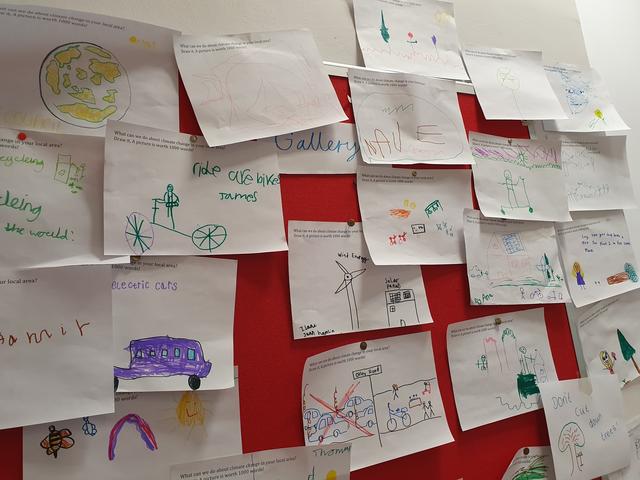Leeds parents and children share views on climate action
11th May, 2022 - 18:22

A University of Leeds public engagement event on 7 May has provided an opportunity for researchers to understand how children and adults view climate solutions.
Members of the team from Leeds Climate Commission joined University of Leeds colleagues for Be Curious, the University’s annual research open event, which showcases how research at Leeds is making a difference to people’s lives.
The all-day event, which was attended by over 1,000 people, included free activities for all the family with over 35 interactive stalls and activities across a range of themes from Caring for Health and Supporting Society to Inspiring Innovation and Discovery and Enabling Sustainable Lives.
The climate researchers used the occasion to talk to parents about the Leeds Net Zero Carbon Roadmap, produced by Leeds Climate Commission, and to encourage them to make pledges about actions they could take personally, or would like to see at neighbourhood and city levels.
Children were asked to draw a picture of an action to tackle climate change that they would like to have access to in their local area.
Green space and transport
Dr Sheridan Few, a Research Fellow from the Sustainability Research Institute, who led on the organisation of the climate stall, said: “Two themes really stood out and featured in many of the pictures. The first was green space, particularly tree and flower planting, more and better quality parks and outdoor space, less littering and more recycling. The second was transport: more cycling, walking, and better public transport and fewer cars.
“Three pictures focused on electricity supply, including solar panels and wind turbines, and one on a sustainable house with a heat pump. Some focussed more on technological solutions, with calls for electric solar powered cars, and there were two requests for drones: one that plants trees, and another that ‘collects all pollution and converts it to pure oxygen’.
“Another inspiring picture simply said, ‘Make your voice be herd’ [sic], a brilliant reminder of why these kind of events are so important.”
Climate actions 'make life better'
Simon Moore, Communications and Engagement Officer for Leeds Climate Commission, said: “I was pleasantly surprised to see how quickly children could identify some of the key solutions to the climate crisis here in Leeds. It also speaks volumes that the solutions many children identified were things that would also make their lives better in the immediate future – often in fun ways. For example, the suggestion to get rid of all cars and swap to bikes and scooters, which would not only help reduce carbon emissions but would lead to happier and fitter people too.”
Vanessa Ternes, a PhD student at the Institute for Transport Studies, also commented on the pictures showing that children want fewer cars and more room to play, walk and meet their friends. She added: “I was impressed to see how much the children already knew about climate change and how aware some of them were of actions to mitigate it. But it also made me sad – nobody should be worried about their future and the future of the planet at such a young age.
“Hopefully kids can soon again enjoy their childhood with the trust that the adults (yes, that’s us!) will look well after the climate for them.”
Pledges to do more - and less
Personal commitments made by the adults on a “Pledge Wall” included promises to cycle more, reuse and repair, re-wear clothes and buy less, visit Leeds’ ‘Library of Things’, switch to an electric car, plant trees and pollinator-friendly gardens, avoid plastic packaging, boycott palm oil and use public transport more.
At a neighbourhood level people wanted more on-street recycling facilities and greener spaces, while suggestions for city-wide actions included demands for more bike lanes, a campaign to stop people driving to school, and an appeal for a mass transit system for Leeds.
“It’s encouraging that so many of these fit with the actions we need to see happen around transport that come top of the table of carbon-cutting and cost-cutting actions in the Leeds Net Zero Roadmap,” said Kate Lock, Policy and Communications Manager for the Place-based Climate Action Network, who chairs Leeds Climate Commission’s Engagement and Communications Panel.
Anne Velenturf, Head of Yorkshire Circular Lab, who also took part in the Be Curious event, said: “It was so great to see that young people really understand that reusing and repairing things can save carbon. With 50% of carbon emissions coming from resource use, it was encouraging to see that circular economy is being recognised as part of climate action. The Yorkshire Circular Lab will continue to support such actions in collaboration with others.”
Challenges and empowerment
Commenting on the conversations that were held, Sheridan Few added, "The event also highlighted the challenges and disempowerment people can feel in bringing about this change. It's hard to know who has responsibility and where to begin. I spoke with one young mother from Wakefield who was brimming with ideas for transport, green space, and food growing in her city, but didn't feel she had capacity or agency to act on these ideas."
Kate Lock also remarked on a sense of disempowerment coming through some of the adults’ responses. “Many people said, ‘We do our bit’ but there were also people shrugging and saying, ‘Well, what can you do?’"
Responses were mostly positive, though. Sheridan Few reflected that, "Some of the commitments I found most inspiring were those that focused everyday interactions, from a teacher who committed to 'educate children to make a difference in their communities to stop [the] impact of climate change', to 'cooking a vegetarian meal for my friends'."
Speaking on behalf of Leeds Climate Commission, Kate Lock said: “My takeaway is that we need to do more to provide information about the support and opportunities for taking climate action and the benefits this brings. Even more importantly, we need to ensure that the message about the power of collective action at all levels, from neighbourhood to city to businesses and of course national government, is heard.”


